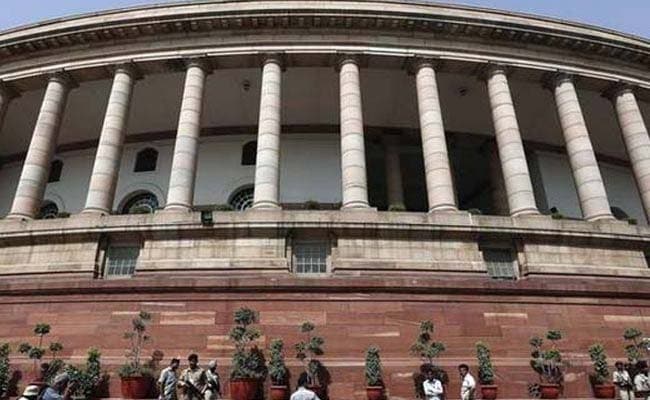
he last revision in salary of Indian lawmakers was done in 2010 during UPA-II rule.
New Delhi:
Amid demands that lawmakers should not be allowed to decide their salaries, the National Democratic Alliance government has proposed to set up a three-member panel to recommend their pay and perks.
The proposal is part of the agenda notes prepared for the two-day All India Whips' Conference to be held at Visakhapatnam, next week.
"The setting up of an independent Emoluments Commission for recommending the salaries and allowances of the Members of Parliament will not only put to rest the public outcry and media criticism over MPs themselves deciding their salaries, it will also provide an appropriate opportunity to take into consideration the huge responsibilities and the important role they play in our representative democracy," said the note.
According to officials, this would help in ensuring that the salary of lawmakers is decided in a fair, transparent and equitable way. After reaching a consensus on setting up the Commission, the Salary, Allowances and Pension of Members of Parliament Act, 1954 will be suitably amended.
The last revision in salary of lawmakers was done in 2010 during UPA-II rule.
Currently, a lawmaker gets a basic salary of Rs 50,000 per month. In addition, Rs 2,000 per day is paid as daily allowance when they sign the register while attending Parliament sessions or House committee meetings.
Each lawmaker is entitled to a monthly constituency allowance of Rs 45,000, another Rs 15,000 for stationery and Rs 30,000 to employ secretarial assistance staff. They are also provided government accommodation, air travel and train travel facilities, besides three landline and two mobile phones, apart from Rs four lakh loan to buy a vehicle.
As per a comparative analysis of in 37 developing and developed countries, lawmakers of only in six countries, Tunisia, Venezuela, Sri Lanka, Nepal, Haiti and Panama are drawing salary less than that of Indian lawmakers.
According to a survey conducted by Inter-Parliamentary Union (IPU) of 138 chambers from 104 Parliaments, 69 chambers indicated that it is Parliament which determines the salaries of members, while salaries in only three countries are determined by independent bodies.
The proposal is part of the agenda notes prepared for the two-day All India Whips' Conference to be held at Visakhapatnam, next week.
"The setting up of an independent Emoluments Commission for recommending the salaries and allowances of the Members of Parliament will not only put to rest the public outcry and media criticism over MPs themselves deciding their salaries, it will also provide an appropriate opportunity to take into consideration the huge responsibilities and the important role they play in our representative democracy," said the note.
According to officials, this would help in ensuring that the salary of lawmakers is decided in a fair, transparent and equitable way. After reaching a consensus on setting up the Commission, the Salary, Allowances and Pension of Members of Parliament Act, 1954 will be suitably amended.
The last revision in salary of lawmakers was done in 2010 during UPA-II rule.
Currently, a lawmaker gets a basic salary of Rs 50,000 per month. In addition, Rs 2,000 per day is paid as daily allowance when they sign the register while attending Parliament sessions or House committee meetings.
Each lawmaker is entitled to a monthly constituency allowance of Rs 45,000, another Rs 15,000 for stationery and Rs 30,000 to employ secretarial assistance staff. They are also provided government accommodation, air travel and train travel facilities, besides three landline and two mobile phones, apart from Rs four lakh loan to buy a vehicle.
As per a comparative analysis of in 37 developing and developed countries, lawmakers of only in six countries, Tunisia, Venezuela, Sri Lanka, Nepal, Haiti and Panama are drawing salary less than that of Indian lawmakers.
According to a survey conducted by Inter-Parliamentary Union (IPU) of 138 chambers from 104 Parliaments, 69 chambers indicated that it is Parliament which determines the salaries of members, while salaries in only three countries are determined by independent bodies.
Track Latest News Live on NDTV.com and get news updates from India and around the world

